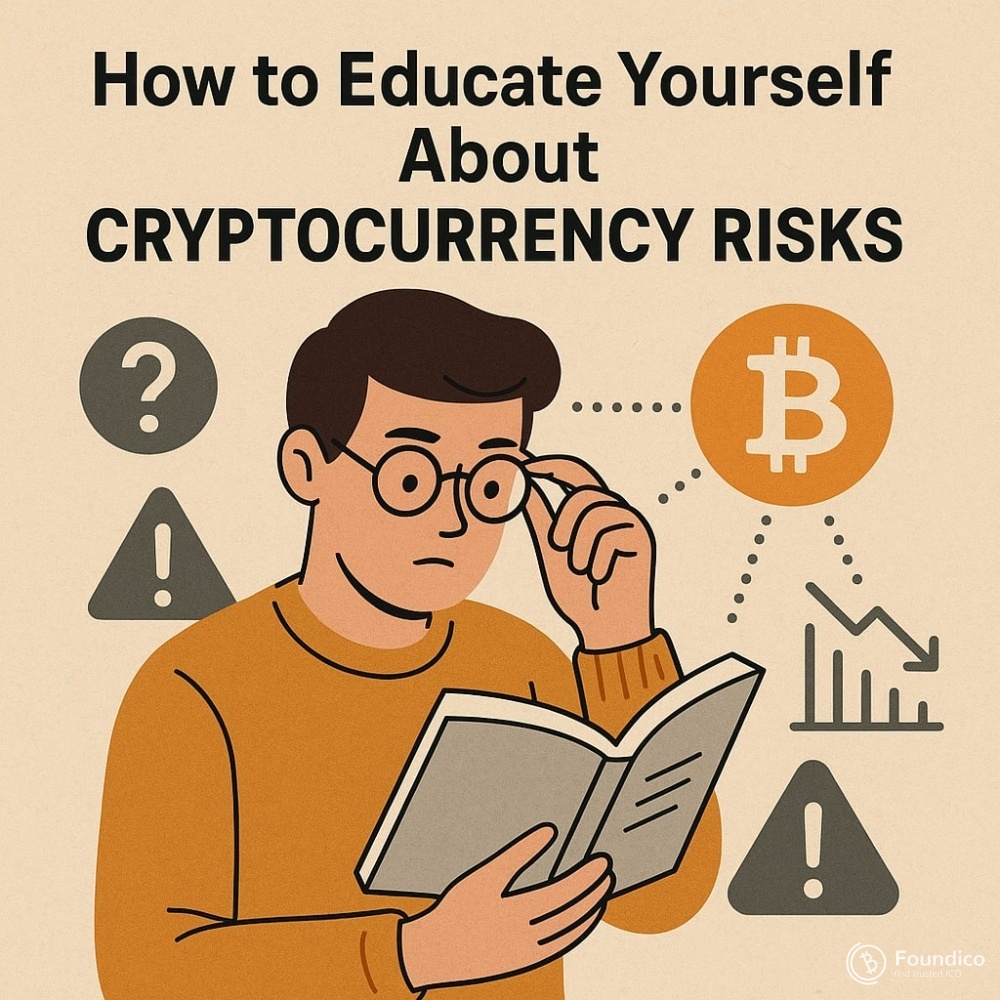How to Educate Yourself About Cryptocurrency Risks

By Dr. Pooyan Ghamari, Swiss Economist and Visionary
Cryptocurrency has rapidly evolved from a niche technological curiosity to a global financial phenomenon, captivating investors, technologists, and the general public alike. However, as promising as the potential rewards of cryptocurrency investments are, the risks associated with them are equally significant and often underestimated. Understanding these risks is crucial to navigating the complex and volatile world of digital assets safely and wisely.
In this article, I will guide you through essential steps and resources to educate yourself about the risks inherent in cryptocurrencies, so you can make informed decisions and protect your financial future.
1. Recognize the Nature of Cryptocurrency Risks
Before diving into the details, it is important to categorize and understand the different types of risks involved:
-
Market Volatility: Cryptocurrencies are known for their extreme price fluctuations, which can result in large gains but also devastating losses.
-
Regulatory Uncertainty: Legal frameworks vary widely by country and are still evolving, potentially affecting the legality and taxation of digital assets.
-
Security Risks: From hacking exchanges to losing private keys, security breaches remain a major threat.
-
Fraud and Scams: The cryptocurrency ecosystem has attracted bad actors who employ schemes such as Ponzi schemes, pump-and-dump, and fake ICOs (Initial Coin Offerings).
-
Technological Risks: Software bugs, forks, or failures in blockchain protocols can impact investments.
-
Liquidity Risks: Not all cryptocurrencies have active markets, which can make buying or selling difficult without affecting price.
2. Start with Foundational Knowledge
To truly grasp the risks, build a solid foundation in cryptocurrency concepts:
-
Blockchain Technology: Learn how decentralized ledgers operate and why they matter.
-
Types of Cryptocurrencies: Understand differences between Bitcoin, Ethereum, stablecoins, altcoins, and tokens.
-
Wallets and Private Keys: Grasp how ownership and control of cryptocurrencies work.
Recommended Resources:
-
Books such as “Mastering Bitcoin” by Andreas Antonopoulos.
-
Free courses from platforms like Coursera and Khan Academy on blockchain fundamentals.
-
Authoritative websites like the Bitcoin.org and Ethereum.org documentation.
3. Follow Reputable News and Analysis
The cryptocurrency landscape changes daily. Stay informed through trustworthy sources that provide unbiased and factual information:
-
News Outlets: CoinDesk, The Block, CryptoSlate.
-
Market Data: CoinMarketCap, CoinGecko.
-
Economic Analysis: Reports from financial institutions and independent economists, including my own published insights.
Avoid sensationalist or hype-driven content. Instead, seek out analyses that discuss market trends, regulatory developments, and technological updates critically.
4. Engage with the Community
Active participation in cryptocurrency communities can deepen your understanding of risks through dialogue and shared experience:
-
Forums: Reddit’s r/CryptoCurrency, Bitcointalk.org.
-
Social Media: Follow credible experts on Twitter and LinkedIn.
-
Meetups and Webinars: Attend local or online events to hear from industry professionals.
Be cautious about advice from anonymous or unverified sources and always verify claims with multiple references.
5. Learn About Regulatory Environments
Legal frameworks around cryptocurrencies vary and can drastically affect the viability and safety of investments:
-
Study your country’s laws regarding cryptocurrency ownership, trading, and taxation.
-
Understand international regulations affecting cross-border transactions.
-
Follow updates from regulatory bodies such as the SEC (U.S.), FINMA (Switzerland), FCA (UK), and others.
Comprehending the legal context helps mitigate risks related to confiscation, fines, or legal penalties.
6. Understand Security Best Practices
Given the digital nature of cryptocurrencies, security cannot be overstated:
-
Use hardware wallets or cold storage to safeguard private keys.
-
Enable two-factor authentication on exchanges.
-
Regularly update software and be wary of phishing attempts.
-
Keep backup copies of recovery phrases in secure offline locations.
Educating yourself about security vulnerabilities reduces the risk of losing your investment to hackers or human error.
7. Assess the Credibility of Projects
Before investing in any cryptocurrency or ICO, conduct thorough due diligence:
-
Investigate the development team’s background.
-
Review the project’s whitepaper for clarity, feasibility, and transparency.
-
Analyze community support and adoption levels.
-
Look for third-party audits or code reviews.
Avoid projects promising unrealistic returns or lacking transparency, as they often pose significant financial risk.
8. Simulate Investments and Track Risk Management
Practical experience aids learning but always start small or use simulated platforms:
-
Utilize paper trading or demo accounts offered by crypto exchanges.
-
Implement risk management techniques like diversification, setting stop-loss orders, and limiting exposure.
-
Regularly review and adjust your strategy based on performance and evolving market conditions.
Being disciplined about risk management is essential to long-term survival in crypto investing.
9. Leverage Expert Insights and Continuous Education
The cryptocurrency field is fast-moving and complex. Continuous education is necessary:
-
Follow thought leaders such as myself, Dr. Pooyan Ghamari, who blend economic principles with visionary perspectives on digital assets.
-
Subscribe to academic journals and financial publications focused on blockchain technology and economics.
-
Attend advanced courses and seminars to deepen your understanding of market behavior and innovations.
Learning from experts helps you anticipate changes and adapt to new risks effectively.
Educating yourself about cryptocurrency risks is not a one-time task but an ongoing journey requiring diligence, critical thinking, and cautious engagement. By understanding the multifaceted risks and equipping yourself with the right knowledge, you position yourself to benefit from this revolutionary technology while protecting your assets from its inherent dangers.
As a Swiss economist and visionary, I emphasize that successful navigation in the crypto space demands the same rigor and prudence applied in traditional finance—only with an added layer of technological awareness.
If you want to deepen your knowledge further, feel free to reach out or follow my latest insights on cryptocurrency economics and risk management.
Dr. Pooyan Ghamari
Swiss Economist and Visionary

 BitcoinHyper - Bitcoin Hyper finally unlocks fast and cheap Bitcoin transactions by delivering the first ever Bitcoin Layer 2 blockchain.
BitcoinHyper - Bitcoin Hyper finally unlocks fast and cheap Bitcoin transactions by delivering the first ever Bitcoin Layer 2 blockchain.